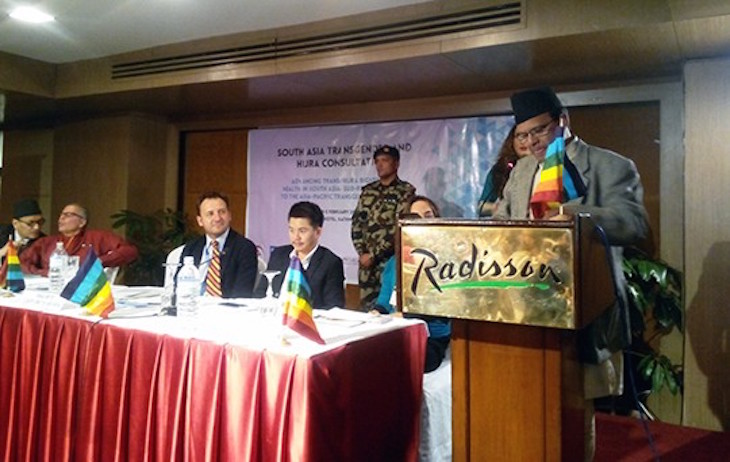The Health Policy Project ended in 2016. Work continued under Health Policy Plus (HP+) until 2022.
NEWS & VIEWS

Dr. Minendra Rijal, Honorable Minister for Information and Communication of Nepal, inaugurates the South Asia Transgender and Hijra Consultation. Photo by the Blue Diamond Society.
Posted February 17, 2015
In early February, the USAID- and PEPFAR-funded Health Policy Project provided support to a three-day consultation in Kathmandu, Nepal. The event was organized by Blue Diamond Society, Asia-Pacific Transgender Network, and UNDP; UNAIDS, USAID, and PEPFAR also provided support. UNDP’s press release can be read here.
The meetings offered a forum for South Asian transgender and hijra (a term used in South Asia to refer to transsexual or transgender persons) stakeholders and activists to articulate their concerns and constructively engage with legislators and policymakers on creating evidence-based policies to advance health, living conditions, and overall well-being for these communities.
As a result of pervasive stigma and discrimination, South Asian transgender and hijra communities are often socially, legally, and economically marginalized. Recognizing that advances toward greater equality and social justice require input and buy-in from a wide array of actors, the event convened representatives from the transgender community, civil society organizations, government agencies, human rights organizations, development partners, and health and HIV experts. Dr. Minendra Rijal, Nepal’s minister for information and communication, also attended.
In particular, poor health outcomes relative to less marginalized populations—especially those related to HIV and AIDS—were identified as a major concern for transgendered communities. These outcomes are largely a result of the criminalization of same-sex sexual activity, which creates both a perceived need to engage in risky sexual behaviors and barriers to accessing health services.
While several governments in South Asia have recognized transgender status, the meeting participants acknowledged that affirmative programs should extend beyond those that offer services related to HIV and other sexually transmitted infections. In particular, guarantees of equal access to education, employment, and health services represent major goals for activists.
Attendees agreed that social engagement to engender behavior change—and the reduction of stigma and discrimination—within communities can be just as important for progress toward transgender and hijra equality as the adoption of legal solutions. Transgender leaders can play an important role in spearheading such efforts through advocacy and stakeholder engagement.
Finally, because the adaptation of effective strategies used elsewhere is often a crucial input to social or policy solutions, participants were offered success stories from Southeast Asia and the Pacific. Several governmental and development leaders in attendance promised to work in tandem with transgender leaders and advocates to overcome challenges stemming from marginalization and lack of equal opportunities.
Read UNDP’s press release on the consultation here.
What's New
- Something to Build On: “Innovation Exchange” Celebrates the Health Policy Project’s Close and a New Beginning
- What Will it Take for Tanzania to Achieve ART Targets and Ensure Long-Term Sustainability of the HIV Response?
- Helping Kenya’s County Leaders Advocate for Increased Health Investments
- HPP Holds Working Meeting on Ensuring Responsible PEPFAR Transitions for Key Populations
- Health Policy Project Celebrates 2016 International Women's Day
- HPP Staff Participate in White House Conference on HIV Stigma Reduction

